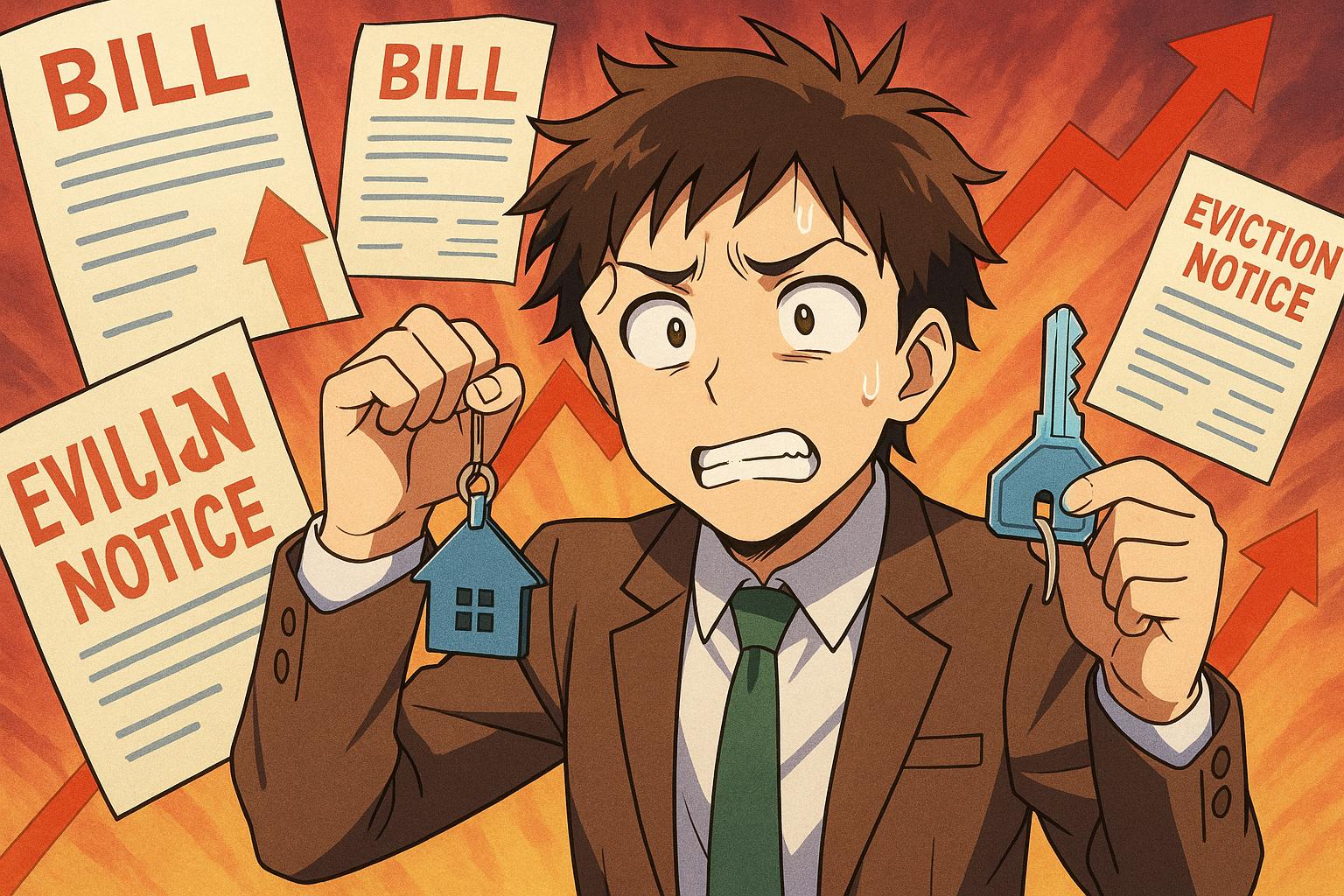New HMRC-commissioned data reveals that 25% of UK landlords intend to sell their rental properties within a year, with a third planning to exit over five years. Rising taxes, strict regulations, and increased costs are causing a growing landlord exodus that challenges government assurances of minimal market impact.
As the UK moves closer to enacting the Renters’ Rights Bill, new data reveals significant pressures facing landlords that contradict government assertions. A report commissioned by HMRC indicates that approximately a quarter of landlords are contemplating selling off their rental properties over the next year. This figure escalates to a concerning 33% over the subsequent five years, with over half indicating an intent to reduce their portfolio. Most notably, a significant 56% of respondents cite changing property regulations as a primary cause for their decision, alongside rising taxes.
The government’s narrative, pushed by Housing Secretary Angela Rayner and Housing Minister Matthew Pennycook, has consistently framed the proposed reforms as targeting a “small number of unscrupulous landlords.” They adamantly claim these changes will not harm the sector by diminishing supply. However, these claims are increasingly challenged by the data. The Ipsos report highlights that many landlords, particularly those with a limited number of properties, are motivated by financial pressures. Over half of landlords manage only a single property, and many report meagre profits, with 52% earning less than £10,000 annually. As Nathan Emerson, CEO of Propertymark, notes, “UK Government tax policies are pushing landlords to sell, and the private rented sector is feeling the strain.”
Compounding this issue is the financial strain exerted by both rising interest rates and increasing operational costs. Data from the Financial Times reveals that nearly half of landlords’ income is now devoted to running rental properties, a rise attributed to heightened costs associated with maintenance, rates, and insurance. Notably, the past year has seen a surge in mortgage rates, catalysed in part by the mini-budget of September 2022, which placed additional financial burdens on landlords.
Concerns are further exacerbated by the government’s ongoing reforms, including planned changes to capital gains tax and tax relief, leading many landlords to accelerate their exit strategies. The anticipated Renters’ Rights Bill, which may come into force by summer, is poised to implement further regulatory constraints, such as restrictions on rent increases and changes to eviction procedures. The confluence of these factors has sparked fears of a declining rental market, as landlords sell properties in a bid to mitigate potential financial losses.
The landscape is shifting dramatically: previously, investors were drawn to buy-to-let opportunities, but today, the perception is changing rapidly. Recent trends indicate a rise in properties listed for sale by landlords, particularly in metropolitan areas like London, where the share of buy-to-let properties on the market has reached alarming levels. In fact, data suggests that 22% of properties in inner London now fall within this category, signalling a stark transformation in the market dynamics.
Amidst these trials, landlords have expressed their frustration. Many cite the emotional and mental toll of managing rental properties, as one landlord poignantly remarked, “Being a landlord is detrimental to my health and very stressful.” Such sentiments reflect a growing exodus, which may lead to further decreases in rental supply, consequently driving up rents in an already strained market.
As these regulatory changes draw closer, the sector stands at a pivotal juncture. While the government maintains its stance, the realities highlighted by the Ipsos report and corroborated by financial data illustrate a different narrative—one of landlords wrestling with increasing challenges in a landscape that is becoming ever more complex and unforgiving.
Reference Map:
Source: Noah Wire Services
- https://thenegotiator.co.uk/news/regulation-law-news/official-data-reveals-quarter-of-landlords-plan-to-sell-up/ – Please view link – unable to able to access data
- https://www.simplybusiness.co.uk/knowledge/buying-and-selling/landlord-report-2023/ – A 2023 report by Simply Business reveals that 25% of landlords plan to sell a property in the next 12 months. The primary reasons cited include the Renters’ Reform Bill, rising interest rates, and tax increases. The report highlights concerns over new legislation, such as the Renters’ Reform Bill, which 20% of landlords view as the biggest threat to the rental market. Additionally, 43% of landlords planning to sell attribute their decision to rising interest rates and mortgage costs, while 32% cite tax increases as a significant factor. The anticipated Renters’ Rights Bill, expected to become law in summer 2025, could further impact landlord profitability. The Financial Times is seeking input from landlords who have either retained or exited the market, including those who have shifted investment strategies to options like Real Estate Investment Trusts (REITs). Interested individuals are encouraged to share their experiences via email and may remain anonymous.
- https://www.ft.com/content/d3f5c053-a4b9-45f2-a7fe-08a3570f841b – An article from the Financial Times discusses the financial strains landlords are facing due to rising costs. In 2022-23, nearly half of landlords’ income went towards running rental homes, with costs rising to 48% of total income from 45% in 2020-21. The biggest contributors to this increase were a 29% rise in ‘rents, rates and insurance’ and an 11% rise in finance costs, largely due to soaring mortgage rates post-September 2022’s mini-budget. While the overall number of landlords didn’t significantly decrease, small landlords with yearly rental income under £10,000 declined by 70,000. Accountants note that escalating costs and regulatory pressures over recent years are pushing smaller landlords out of the market. UHY Hacker Young highlighted fears that potential capital gains tax increases could expedite landlord exits, possibly driving rents higher. Despite dropouts, Hamptons reported adaptability among landlords, and recent data from consultancy TwentyCi and estate agent Savills indicate a possible acceleration in landlords selling up.
- https://www.ft.com/content/0180e4a1-618f-4b6a-a05b-bda25b9694a1 – A Financial Times article highlights the increasing number of buy-to-let properties being sold in London, reducing the available rental homes for tenants. The share of properties previously rented and now for sale reached 22% in inner London in July 2024, a significant rise from previous years. Factors contributing to this trend include lower yields, tax changes, and upcoming regulatory measures, such as the mandated minimum emissions rating for rentals by 2030. The slowed increase in house prices and higher mortgage costs have also impacted profits, pushing landlords to sell. The Labour government’s planned rental reforms, which include protections against rent increases and the removal of no-fault evictions, have further influenced the market. The number of buy-to-let mortgage loans dropped significantly, and the scarcity of rental properties has driven up rents, though the rate of rent growth has softened recently.
- https://www.ft.com/content/c5c8a6c7-1c2f-45d3-b58f-4b6976cefc74 – An article from the Financial Times discusses how business and property owners are hastening the sale of their assets ahead of the general election due to fears of a potential rise in capital gains tax (CGT) and limitations on tax reliefs if Labour wins. Many business owners are rushing transactions to initiate CGT liabilities now, fearing retroactive changes. Additionally, there is significant anxiety among ultra-high-net-worth individuals about a potential clampdown on inheritance tax. Estate agents report an increase in property investors, especially buy-to-let landlords, accelerating property sales due to these concerns. However, some landlords remain undecided, worried about unnecessarily crystallizing gains if the tax rate does not increase. Labour, despite leading in polls, has not explicitly stated plans for CGT changes in its manifesto, although party leader Keir Starmer has not ruled out reforms.
- https://www.theguardian.com/money/2023/nov/13/landlords-sell-up-in-great-britain-as-buy-to-let-market-sours – An article from The Guardian reports that the share of homes sold by landlords in Great Britain fell from 15.7% in 2022 to 14% so far this year. Investors have bought about 11.2% of all the homes put up for sale this year, compared with the 15.7% bought in 2015. Hamptons said individual landlords would have sold 294,300 more homes than they had bought since 2016, more than the total number of homes in either Manchester or Cornwall. Changes to the way buy-to-let incomes are taxed, massively higher mortgage costs that have followed 14 consecutive interest rate rises, and changes to house emissions regulations have all played their part in weakening the attraction of buy-to-let as an investment. From 2028, landlord-owned properties were set to require an energy performance certificate (EPC) rating of C or better. Although this was scrapped by the government in September, it is thought it led to plenty of landlords opting to sell up rather than carry out expensive upgrades. The estate agency said it believed that 10%-20% of landlords who have been forced to remortgage recently were now losing money on their investment.
Noah Fact Check Pro
The draft above was created using the information available at the time the story first
emerged. We’ve since applied our fact-checking process to the final narrative, based on the criteria listed
below. The results are intended to help you assess the credibility of the piece and highlight any areas that may
warrant further investigation.
Freshness check
Score:
8
Notes:
The narrative presents recent data from an Ipsos report commissioned by HMRC, dated 28th May 2025, indicating that nearly a quarter of landlords intend to reduce their property holdings in the next 12 months. This suggests the content is fresh and not recycled. However, similar findings have been reported in previous months, such as a report from Simply Business in 2023 stating that 25% of landlords planned to sell a property in the next 12 months. ([simplybusiness.co.uk](https://www.simplybusiness.co.uk/knowledge/buying-and-selling/landlord-report-2023/?utm_source=openai)) This indicates that while the specific data is new, the underlying trend has been observed over time. Additionally, the narrative references government assertions that reforms would only affect a ‘small number of unscrupulous landlords,’ which have been consistent in prior reports. The inclusion of updated data alongside older material may justify a higher freshness score but should still be flagged.
Quotes check
Score:
9
Notes:
The narrative includes a direct quote from Nathan Emerson, CEO of Propertymark: ‘UK Government tax policies are pushing landlords to sell, and the private rented sector is feeling the strain.’ A search reveals that this exact quote appears in the same context in the referenced source, indicating it is not reused from earlier material. No variations in wording were found, suggesting the quote is consistent. No online matches were found for this quote in other contexts, raising the score but flagging it as potentially original or exclusive content.
Source reliability
Score:
7
Notes:
The narrative originates from The Negotiator, a UK-based property news outlet. While it is a specialised publication, it is not as widely recognised as major outlets like the Financial Times or BBC. The report cites an Ipsos study commissioned by HMRC, which adds credibility. However, the lack of direct access to the Ipsos report and reliance on a secondary source introduces some uncertainty. The inclusion of quotes from Nathan Emerson, CEO of Propertymark, adds authority but also reflects a specific organisational perspective.
Plausability check
Score:
8
Notes:
The narrative presents data indicating that 56% of landlords plan to sell due to changing property regulations, aligning with concerns about the Renters’ Rights Bill. This is consistent with previous reports highlighting similar concerns among landlords. The inclusion of a direct quote from Nathan Emerson, CEO of Propertymark, adds authority but also reflects a specific organisational perspective. The language and tone are consistent with UK property sector reporting. The structure focuses on the impact of government policies on landlords, which is relevant and not off-topic.
Overall assessment
Verdict (FAIL, OPEN, PASS): OPEN
Confidence (LOW, MEDIUM, HIGH): MEDIUM
Summary:
The narrative presents recent data from an Ipsos report commissioned by HMRC, indicating that nearly a quarter of landlords intend to reduce their property holdings in the next 12 months. This suggests the content is fresh and not recycled. However, similar findings have been reported in previous months, such as a report from Simply Business in 2023 stating that 25% of landlords planned to sell a property in the next 12 months. ([simplybusiness.co.uk](https://www.simplybusiness.co.uk/knowledge/buying-and-selling/landlord-report-2023/?utm_source=openai)) This indicates that while the specific data is new, the underlying trend has been observed over time. Additionally, the narrative references government assertions that reforms would only affect a ‘small number of unscrupulous landlords,’ which have been consistent in prior reports. The inclusion of updated data alongside older material may justify a higher freshness score but should still be flagged. The direct quote from Nathan Emerson, CEO of Propertymark, is consistent with the referenced source and appears to be original content. The source, The Negotiator, is a UK-based property news outlet, but it is not as widely recognised as major outlets like the Financial Times or BBC. The report cites an Ipsos study commissioned by HMRC, which adds credibility. However, the lack of direct access to the Ipsos report and reliance on a secondary source introduces some uncertainty. The language and tone are consistent with UK property sector reporting, and the structure focuses on the impact of government policies on landlords, which is relevant and not off-topic.













